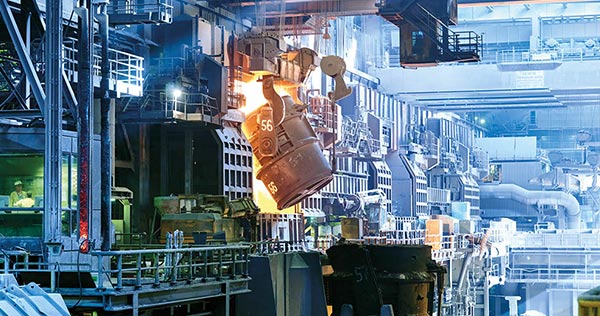
Federal Environment Minister Svenja Schulze on a visit to ThyssenKrupp Steel in Duisburg
Federal Environment Minister Svenja Schulze visited ThyssenKrupp Steel’s steel mill in Duisburg during her Summer tour to learn on site about the plans of Germany‘s largest steel producer to make its production operations completely climate-neutral, and invited the company to submit a funding request for a direct reduction plant within the scope of the BMU’s Funding Program Decarbonization. An initial project outline had previously met with a positive response from the German Federal Environment Agency and the Kompetenzzentrum Klimaschutz in Energieintensiven Industrien (KEI).
ThyssenKrupp Steel accounts for 2.5% of CO2 emissions in Germany, and aims to reduce CO2 emissions by 30% in this decade. To this end, the company has worked out concrete projects. From 2025, the four blast furnaces will be gradually replaced with direct reduction plants operated with green hydrogen, each of which equipped with an innovative melting unit to make liquid hot metal from the solid raw material. According to ThyssenKrupp, investments of two billion euros are needed for implementing this project by 2030 and up to eight billion euros for the complete transformation.
Federal Environment Minister Svenja Schulze: “For more than 200 years, the industry has used coal to make steel. We will help to ensure that hydrogen generated from wind and solar energy will replace coal in the future. The transformation of the steel industry is a huge challenge. The Federal Government will not leave the steel industry to shoulder the transformation alone.
“My Ministry provides concrete support for investments in climate protection by the Funding Program Decarbonization. With the increased funding for climate protection contracts, we will support the industry which will be faced with higher operating costs in order to create investment reliability for post-fossil technologies.
The prerequisite for all this is the development of renewable energies. If you say yes to sustainable steel production, you must also say yes to the determined development of wind and solar energy.“
Bernhard Osburg, Chairman of the Executive Board of ThyssenKrupp Steel: “We are glad that our project outline has met with a positive response, and are going to submit our funding request. We have a clear technological concept for climate-neutral steel production and are ready to go. We want to show how decarbonization can work on a large industrial scale. Our transformation project can make Duisburg a model for the transformation – towards a competitive, climate-neutral industry creating innovation and value in German and Europe.“
At about 58 million metric tons of CO2 emissions, the steel industry accounts for approximately 6% of CO2 emissions in Germany and is facing enormous challenges posed by the transformation to greenhouse gas neutrality. Both the sector and the Federal Environment Ministry have high hopes for the transition to hydrogen-operated so-called direct reduction plants which are to replace the blast furnaces. In this context, the steel industry has an important competitive advantage over other industrial sectors: In the first transformation stage, it can use natural gas for the direct reduction of iron ore. This is a good way of preparing the market launch of green hydrogen.
As a transitional technology, natural gas can already save a lot of CO2 in the steel industry. The direct reduction process with natural gas is 50% cleaner than steel from the blast furnace. In the medium to long term, natural gas has to be replaced with green hydrogen.